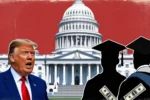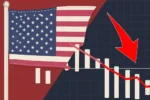Consumer Confidence Takes a Hit: In January, consumer sentiment took a significant hit, dropping by 4%, marking the first decline in six months. This downturn, revealed through the final results from the University of Michigan’s January Surveys of Consumers, highlights growing consumer unease, driven primarily by concerns over rising unemployment and inflation.
While personal finance assessments saw a modest increase for the fifth consecutive month, the overall sentiment indicators moved in the opposite direction. Joanne Hsu, the Director of the Surveys of Consumers, noted in a January 24th press release that sentiment declines were widespread, affecting individuals across various income levels, wealth brackets, and age groups. This signals that the economic challenges facing consumers are broad-based and not limited to specific demographic segments.
Rising Concerns About Unemployment
A primary driver of the sentiment decline is the growing concern over unemployment. According to the survey, 47% of consumers expect unemployment to rise over the next year. This marks the highest level of pessimism since the pandemic-induced recession. With job security at the forefront of many individuals’ minds, this pessimism reflects a more cautious outlook on the economy.
Consumers’ fears about job losses are compounded by rising inflation expectations. The year-ahead inflation forecast increased to 3.3%, the highest level since May and above the typical 2.3% to 3% range that had been prevalent in the years before the pandemic. Similarly, long-term inflation expectations rose to 3.2%, aligning with the reading seen in November. This signals that consumers are bracing for a future where both the cost of living and inflation are higher than they have been in recent years.
Impact of Inflation Concerns on Spending Behavior
Hsu emphasized that concerns about future inflation were visible throughout the interviews conducted for the survey. The general sentiment among consumers is that prices will continue to climb, particularly in light of anticipated policies such as tariffs. These expectations have already started to influence consumer behavior. Many individuals reported purchasing goods now, rather than waiting, in anticipation of higher prices in the future. This “buy now, pay later” mentality may lead to temporary spikes in demand for certain goods, which could exacerbate inflationary pressures in the short term.
The broader concern is that inflation, combined with the potential for higher unemployment, could slow down consumer spending in the longer term. As prices rise, consumers may be forced to allocate more of their income to essential goods and services, leaving less disposable income for non-essential spending. This shift could have significant implications for the overall economy, as consumer spending is a key driver of economic growth.
Political and Trade Policy Uncertainty
The timing of the survey, which closed on Inauguration Day, also suggests that political factors are influencing consumer sentiment. With the transition to a new presidential administration, many consumers are still uncertain about the future direction of policies, particularly trade policies under President Donald Trump. The threat of tariffs on goods from key trading partners like Canada and Mexico, which play vital roles in the U.S. automotive supply chain, has raised concerns about rising prices on imported goods, including new cars.
President Trump has argued that tariffs are a necessary tool to counter unfair trade practices by foreign governments and companies. However, concerns persist that these tariffs could negatively impact consumers, leading to higher prices on a wide range of goods. JPMorgan Chase CEO Jamie Dimon weighed in on this issue, stating that while tariffs can be effective when used strategically, they can also have damaging consequences if misused. Dimon also emphasized the importance of balancing tariff policies with their potential negative impact on both the economy and consumer confidence.
Looking Ahead: The Impact of Inflation and Job Concerns
As the year progresses, it remains to be seen how inflation and unemployment concerns will shape consumer sentiment in the coming months. If inflation continues to rise and unemployment remains a significant worry, consumer confidence could face additional pressure. The current data from the University of Michigan’s January survey points to a fragile economic environment, where consumers are wary of future economic challenges.
Ultimately, policymakers may need to take action to address these concerns by implementing measures that help to stabilize inflation and ensure a healthier job market. Until then, consumers may continue to adjust their spending habits in response to the shifting economic landscape. With ongoing uncertainties around trade policies and inflation, it is crucial for both the government and businesses to carefully consider the potential long-term effects of these economic shifts on consumer behavior.



